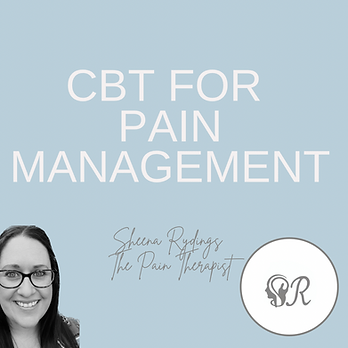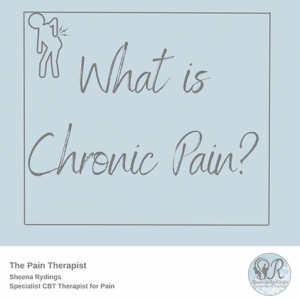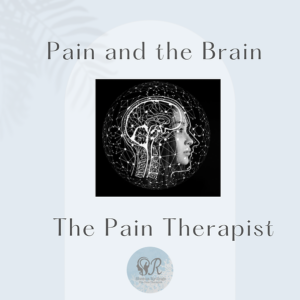Chronic pain can be a debilitating and persistent condition, impacting millions of individuals worldwide. 1 in 5 world wide and 28 million people in the UK have chronic pain. Traditional approaches often involve medication and physical therapy, this is what we called the Biopsychosocial model of pain. Cognitive Behavioral Therapy (CBT) is now recognised as treatment choice alongside Physiotherapy from NICE (National Institute of clinical excellence) guidance, as a valuable tool in managing chronic pain. CBT focuses on changing negative thought patterns and behaviors, offering a holistic approach to pain management.
Understanding Chronic Pain:
Chronic pain goes beyond the physical sensation, it is an emotional experience and often intertwining with many other factors such as social and biological. CBT recognises the interconnected nature of pain, addressing not only the symptoms but also the thoughts and feelings associated with it. By exploring the link between pain and emotions, you can gain insight into your condition and develop effective coping strategies. Some of these strategies are:
Changing Negative Thought Patterns
Cognitive Behavioural Therapy (CBT) for chronic pain, will help you identify and challenge negative thought patterns related to your pain. You wil learn about different thinking styles that may be stuck into thinking such as Catastrophic thinking. This is where you anticipate the worst case scebnario, these unhelpful thinking styles can exacerbate pain perception. Through CBT, you learn to reframe these thoughts, or respons differently to thoughts, fostering a more balanced mindset. This shift in thinking can contribute to a reduction in the impact that pain has on life.
Behavioral Strategies
CBT incorporates behavioral techniques to modify patterns that contribute to the pain experience. This may involve gradual exposure to activities that have been avoided due to pain, promoting a sense of control and confidence. It involves getting back to doing activities in line with your values, doing things that are meaningful for you as a person, as pain can often make our lives get smaller and smaller. Additionally, individuals learn relaxation techniques and stress management skills, addressing factors that can intensify chronic pain.
Developing Coping Skills
Living with chronic pain often requires the development of adaptive coping skills. CBT equips individuals with tools to manage stress, anxiety, and depression – common companions of chronic pain. By enhancing resilience and coping mechanisms, CBT empowers patients to navigate the challenges associated with their condition more effectively.
Enhancing Quality of Life
The goal of CBT in chronic pain management extends beyond mere symptom reduction; it aims to improve overall quality of life. As you gain mastery over their thoughts and behaviors, they often experience improved sleep, increased activity levels, and enhanced emotional well-being. These positive changes contribute to a more fulfilling and satisfying life despite the presence of chronic pain.
Integration of Acceptance and Commitment Therapy (ACT)
ACT can be effective in managing chronic pain by encouraging individuals to accept their pain rather than fighting against it. ACT teaches mindfulness and acceptance, helping people develop a different relationship with their pain. By focusing on values and committing to meaningful actions despite the pain, you may experience improved emotional well-being and a better quality of life. It doesn’t aim to eliminate pain but rather to enhance psychological flexibility and resilience in the face of chronic conditions.
Integration with Other Treatments:
CBT is very effective in helping people live with pain. However it is also important to look at other support for a holistic support with pain. CBT complements physiotherapy offering a well-rounded approach to address the multifaceted nature of chronic pain.
In conclusion, Cognitive Behavioral Therapy has proven to be a valuable asset in the management of chronic pain. By addressing the emotional and psychological aspects of pain, CBT empowers individuals to reshape their experience and regain control over their lives. As part of a comprehensive treatment plan, CBT offers hope and practical strategies for those navigating the complex challenges of chronic pain.
If you feel you may benefit from CBT to help you with your chronic pain please get in touch and let see if I can help you live a more meaningful life and go from surviving to thriving.
Make an appointment with me today to discuss how I can help you on the journey to managing your chronic pain.



